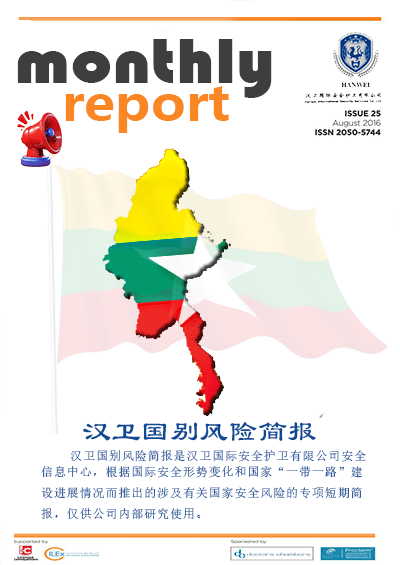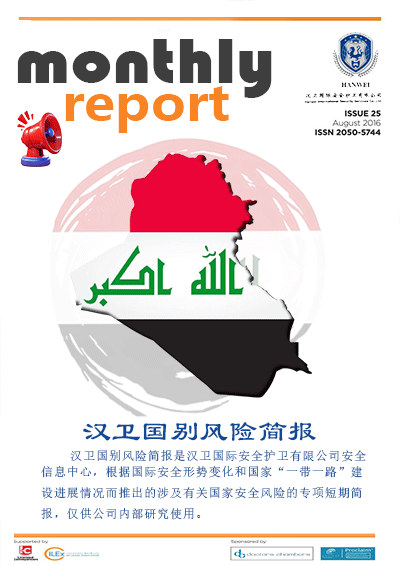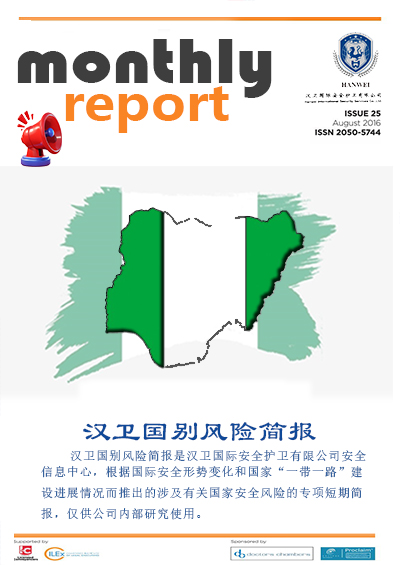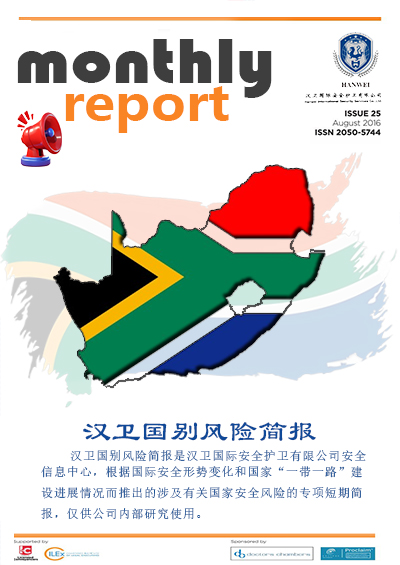Analysis of the Social Security Situation in Nigeria in January 2025
Researcher No. 007
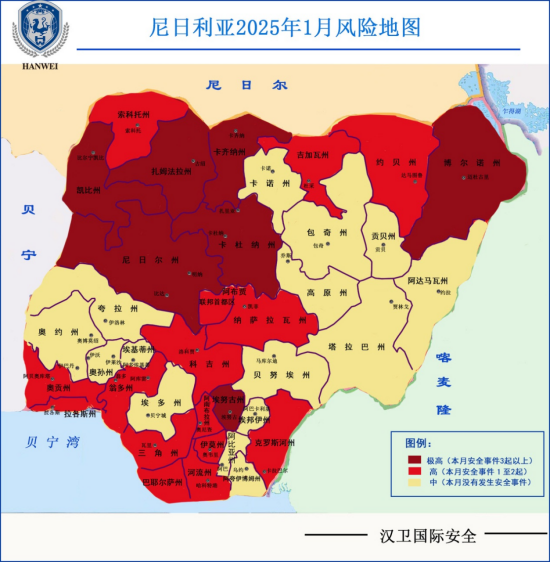
According to the monitoring report of the Security Officer of Hanwei International stationed in West Africa and comprehensive media reports, a total of 48 security incidents occurred in Nigeria in January 2025. A total of 273 civilians and 90 military and police personnel were killed in various security incidents, and at least 107 people were kidnapped. The types of security incidents mainly include armed attacks and kidnappings, conflicts between farmers and herdsmen, and public security accidents, etc. Compared with last month, the number of security incidents increased by 5, the death toll rose by 197, and the number of kidnappings decreased by 5. Analysis suggests that the number of armed attacks and kidnappings in the northwest and northeast of Nigeria this month has significantly increased compared to last month, and ethnic conflicts and other incidents have occurred frequently in the south. In addition, public safety accidents such as the explosion of oil tankers have caused a large number of casualties, and the overall safety situation is complex and severe. Among them, the security risk levels in the northwest, northeast and south of Nigeria are extremely high, while those in other areas are high or medium-high.
I. Comprehensive Analysis of Security Incidents
Among the 48 security incidents that occurred in Nigeria in January, 20 were armed attacks, accounting for 41% of the total. There were 8 cases of armed kidnapping, accounting for 16%. There were 7 public safety incidents, accounting for 14%. There were 6 armed conflicts among nomads, accounting for 12%. There were 7 military clearance operations, accounting for 14%. A total of 577 people were killed and at least 107 were kidnapped in various incidents. Among the deceased, 273 were civilians, 90 were military and police personnel, and 214 terrorists were killed. No security incidents related to demonstrations were reported this month.
The overall security situation presents the following characteristics:
(1) The security risks in the northwest, northeast and central and southern regions are extremely high.In January, security incidents in Nigeria were mainly concentrated in the northwestern states of Zamfarah, Sokoto, Kaduna, Kazina and Niger, as well as in the central-eastern state of Borno and the central-southern state of Enugu. Among them, the Borno State in the central and eastern part has the highest security risk. A total of 7 security incidents occurred, mainly including armed attacks and clearance operations, resulting in 26 deaths and 180 terrorists being killed. Four security incidents occurred in both Katzina State and Niger State, located in the central and western regions. They mainly included armed attacks, armed kidnappings, and public safety accidents, resulting in 45 deaths and 110 deaths respectively, and three people were kidnapped. Three security incidents occurred in Enugu State, located in the central-southern part, mainly including armed attacks, kidnappings and public safety accidents, resulting in 18 deaths and 38 kidnappings. According to the monitoring report of the Hanwei International Security Officer in West Africa, on January 7th local time, about seven suspected Fulani militants suddenly emerged from the thick forest in the 9-mile direction of A3 Road in Egede Town, Enugu State, and opened fire on passing vehicles. This incident indicates that the Fulani herders are moving southward, and the number of kidnappings and attacks in this area may increase significantly. The governor of Oyo State, Sai Mackinde, also issued a warning that bandits were forced to move southwest and set up camp in Oyo State due to military pressure from the north, threatening local security. It is reminded that all Chinese-funded enterprises and personnel in the central and southern regions, as well as the central and western regions, must enhance their safety awareness, attach great importance to the changes in the safety situation in the relevant areas, and improve their capabilities for early and emergency response. In addition, on January 15th, the Nigerian police identified 17 crime-prone areas in Abuja. Including Abudusai Panteka, the Diplomatic District, the newly established PDP Secretariat, Kabusai Panteka, Tonggan Maje, Abuja - Kaduna Highway, Jabi Panteka, Abowalu Panteka, Area 1 (Monkey Village), Durumi Village, Gwaalinpa, Angwan Tivi, Mpape (Mashafa and Shishinpe Village), Durumi III (Burukutu Garden), Yishiri Village, Kubuwa (beside the pipeline and NEPA Road) and Maitama (under Transcorp Bridge). Nigerian police remind residents and tourists to be vigilant when passing through these areas and avoid traveling alone. The police will continue to intensify their raids and patrols, and call on the public to actively report suspicious activities to jointly maintain the security of Abuja.
Figure 1: Distribution Diagram of Monthly Security Incidents
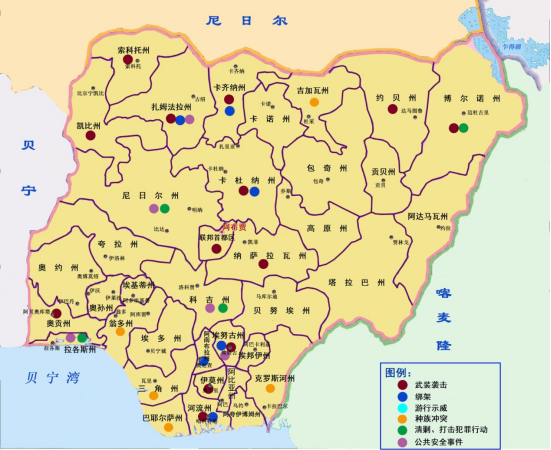
Chart 1: Statistics of Security Incidents in Major Regions in January
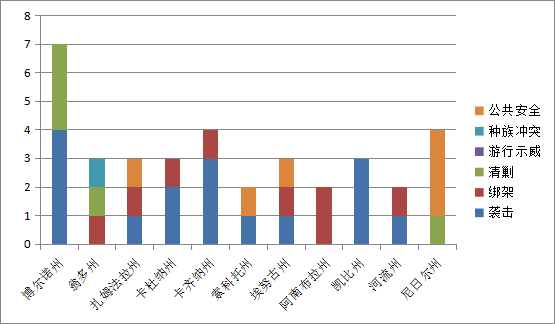
(2) Armed attacks and kidnappings in the north are on the rise.In January, 20 armed attacks and 8 armed kidnappings occurred in Nigeria, resulting in 202 deaths and at least 107 kidnappings. This month, armed attacks and kidnappings mainly occurred in the north, with a notable feature being that military camps became the main targets of the attacks. According to statistics, a total of 8 attacks on military and police personnel occurred this month, resulting in the deaths of 90 military and police personnel. Among them, on the afternoon of January 4th, militants from the "West African Province" (ISWAP) of the Islamic State attacked the Sabon Gari military base in Borno State, resulting in the deaths of six soldiers and the destruction of a large amount of equipment. On January 8th, armed men on motorcycles and driving armed trucks attacked a military camp in Borno State again, causing at least six soldiers to die. At around 2 a.m. on January 9th, suspected Boko Haram terrorists attacked the Gajiram community police station in the Nganzai local government area of Borno State, resulting in the deaths of two police officers. On January 16th, a military facility in Sokoto was attacked by armed forces, resulting in the deaths of five soldiers. On January 24th, a military base in Borno State, Nigeria, was attacked, resulting in at least 20 soldiers' deaths and many others seriously injured. The purpose of the terrorist organization's large-scale attacks on military camps is to weaken the response capability of the Nigerian military and consolidate its position.
Media analysis suggests that the increase in armed attacks in northern Nigeria is related to the situation in Niger. Since the coup in Niger in July 2023, relations between Abuja and Niamey have deteriorated, causing the interruption of joint military patrols between the two countries and giving terrorist organizations an opportunity to take advantage. In the northwest of Nigeria, a new radical organization, "Lakurawa", has emerged. Its activities span the border between Niger and Nigeria, posing a serious threat to the northwest of Nigeria. In November 2024, the Nigerian government issued a warning about the organization, claiming that it was linked to jihadist factions in Mali and Niger. For many years, this organization has been entrenched in the border area between Nigeria and Niger, expanding its influence by marrying local women and recruiting young men. In January 2025, the Nigerian government officially classified the organization as a terrorist organization and authorized the military to carry out maximum military strikes against it.
(3) Multiple incidents related to China have occurred.In January, multiple incidents involving China occurred again in Nigeria. On January 6th, the National Food and Drug Administration (NAFDAC) of Nigeria sealed up a Chinese supermarket in Abuja because the supermarket was suspected of selling goods with Chinese labels without English translations, which violated relevant regulations. According to Nigerian law, all imported goods must be accompanied by English labels for consumers to identify. Secondly, on January 11th, four Chinese citizens and 101 Nigerians were arrested by the Economic and Financial Crimes Commission (EFCC) of Nigeria in a commercial apartment in the Gudu area of Abuja. These people have been accused of being involved in online fraud targeting victims in Europe and other regions. Thirdly, on January 12th, a Chinese citizen was killed by two robbers in his office in Ogun State. On January 17th, the Economic and Financial Crimes Commission (EFCC) of Nigeria launched a raid in Lagos, dismantling a transnational online fraud gang and arresting a total of 792 suspects, including 148 Chinese citizens. This criminal gang mainly involves cryptocurrency investment scams and dating frauds.
(4) Crack down on illegal mining with great force.。In early January, a mining law enforcement officer of the Nigerian Security and Civil Defence Corps (NSCDC) stated that they would intensify the crackdown on illegal mining in 2025 and adopt tougher law enforcement and accountability measures. Nigerian authorities have stated that illegal mining activities seriously threaten the country's economic stability, environmental sustainability and social well-being, causing severe damage to local communities. Illegal mining causes losses of billions of naira to Nigeria every year. According to the World Bank's estimation, Nigeria loses over 9 billion US dollars each year due to illegal mining and smuggling. In addition to economic losses, illegal mining also contributes to local insecurity and organized crime. Amnesty International reported that from January to July 2023, more than 2,000 kidnapping incidents occurred in Zamfarah State alone due to mining disputes. Armed groups often operate in areas rich in mineral resources, using them to fund violent activities. Illegal mining has simultaneously exacerbated poverty and marginalization issues, hindering the fair distribution of Nigeria's mineral wealth. Illegal mining also causes very serious damage to the environment. Unregulated mining often leads to deforestation, water pollution and soil erosion, depletes agricultural land and threatens biodiversity. Hazardous chemicals such as mercury and cyanide used in mining pollute local water sources, posing serious health risks to nearby residents. In addition, the destruction of farmland has exacerbated the food crisis. From a social perspective, illegal mining has led to problems such as community displacement, child labor, and dangerous working environments. In places such as Zamfarah State and Niger State, illegal gold mining has caused lead poisoning incidents, resulting in a large number of deaths. To this end, Nigeria will take stricter law enforcement measures in 2025 to crack down on illegal mining activities. The law enforcement team will combat lawbreakers by gathering strategic intelligence, increasing patrols and resolutely cracking down on illegal mining sites.
(5) Major casualties are caused by public safety incidents such as oil tanker explosions.In January, two explosion accidents, four major traffic incidents and one accidental bombing of civilians by a military aircraft occurred in Nigeria, resulting in a total of 150 deaths. On January 18th, an oil tanker overturned on a road in the Diko area of Niger State, Nigeria. When nearby residents rushed to grab fuel, the tanker caught fire and exploded, resulting in 98 deaths and 25 injuries. On January 25th, a tanker fully loaded with gasoline collided with 17 vehicles on a highway in Enugu State, southern Nigeria, due to brake failure and exploded, resulting in at least 18 deaths and 10 injuries. In addition, cholera outbreaks continue to occur in Nigeria this month. Nine people have died in the Andoni and Akuku-Toru regions of Rivers State, and there are 41 suspected cases. The relevant departments are closely monitoring these two regions and actively taking measures to deal with the epidemic and prevent its further spread.
(6) Continuously carry out military clearance operations.In January, Nigerian security forces continued to carry out military clearance operations in the northern and central-southern regions. On January 9th, the multinational Joint Task Force (MNJTF) stated that it had killed 310 terrorists and dismantled a key logistics base in the Lake Chad area during Operation Lake Sense 2. From January 7th to 13th, the Nigerian military carried out military operations in multiple areas of Borno State in the northeastern part. A total of 76 militants from the extremist groups "Boko Haram" and "West African Province of the Islamic State" were killed, 72 were arrested, 8 hostages were rescued, and a large number of weapons and ammunition including AK-47 rifles, grenades, rocket-propelled grenades and improvised explosive devices were seized. On January 26th, the Nigerian Ministry of Defense announced that in a series of military operations in Borno State in the northeastern part, 70 Boko Haram militants, including three commanders, were killed. The Nigerian military's operations include ground attacks, air strikes, intelligence gathering and special operations, etc., and it has carried out long-term and continuous strikes against terrorist organizations. However, the Lake Chad Basin involves multiple countries such as Chad, Cameroon, Niger and Nigeria. These countries have differences in political interests and strategic priorities, making it difficult for them to achieve an ideal state of collaboration in counter-terrorism operations. For instance, problems are likely to arise in areas such as intelligence sharing, command and coordination of joint military operations, resulting in insufficient integrity and coherence in counter-terrorism operations. Terrorist organizations take advantage of these loopholes to roamed between the borders of various countries, evading pursuit and increasing the difficulty of counter-terrorism. Geographically, the Lake Chad area has a vast expanse of water, numerous islands, marshes and dense vegetation, providing natural hiding places and defensive barriers for terrorist organizations. Boko Haram often uses the small islands on the surface of Lake Chad when there is little water as hiding places. Therefore, given the current counter-terrorism forces, counter-terrorism in Nigeria is a persistent problem without increasing international military support. In addition, the Nigerian military announced its counter-terrorism achievements for 2024 on January 3rd. Throughout the year, a total of 10,937 terrorists were killed, 12,538 were arrested, and 7,063 hostages were rescued. Another 16,171 terrorists and their families surrendered to the military. The military seized 8,815 weapons and 228,004 rounds of ammunition, destroyed illegal oil refining facilities and prevented large-scale oil theft operations.
Chart 2 Comparison of Security Incident Classifications in January
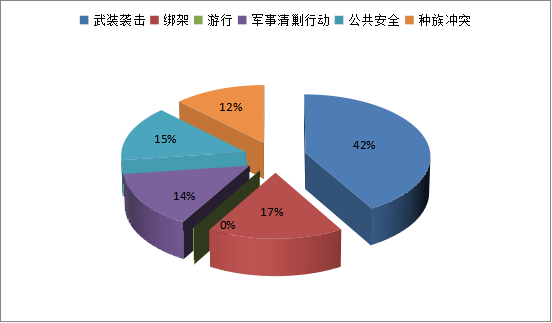
Chart 3 Classification Statistics of Deaths in January
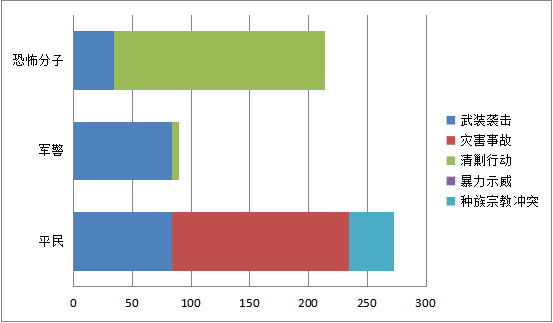
Chart 4 Comparison of the Number of major security Incidents in January and December
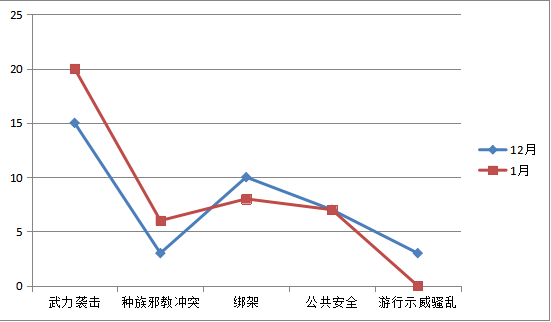
Ii. Risk Early Warning and Prevention Suggestions
Chart 5 Recent social Security Risk Warnings in Asia on the 5th
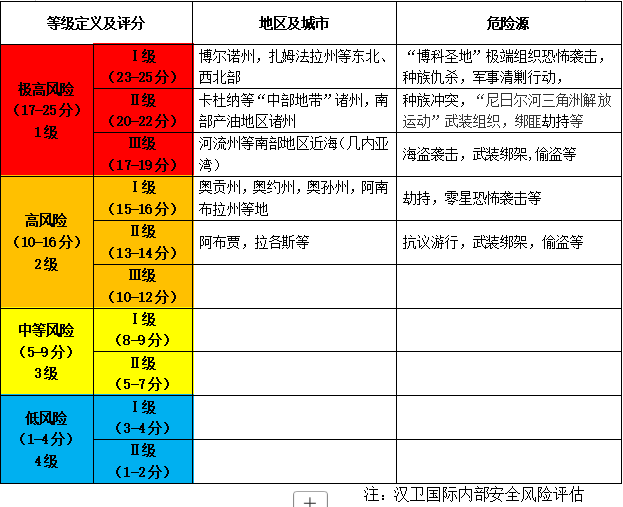
Given the complex social environment and high-risk security assessment in Nigeria, the following security measures are recommended:
The first is to provide full-time security services during travel.In remote rural areas of Nigeria, the police force is limited and the road infrastructure is poor. As a result, the response of security forces to violent crimes and riots and conflicts is often seriously delayed. Therefore, Chinese-funded enterprises and others should promptly obtain the latest local security intelligence, conduct specific security assessments of the travel destinations, and have security personnel accompany and protect them.
The second is to enhance safety precautions at the beginning of the year.In January, terrorist attacks occurred frequently in northern Nigeria, ethnic conflicts were frequent in central and southern Nigeria, and various public security incidents caused heavy casualties. For this reason, on January 28th, the Chinese Embassy in Nigeria reminded Chinese-funded enterprises and Chinese citizens in Nigeria to enhance safety during the Spring Festival and other holidays. As the Spring Festival of the Year of the Snake approaches, the Embassy of China in Nigeria and the Consulate General of China in Lagos remind Chinese-funded enterprises and Chinese citizens in Nigeria to attach great importance to their own safety and take measures to prevent all kinds of risks. First, we must closely monitor the situation. Pay attention to the safety dynamics around the campsite, accommodation and residence, and observe whether there are any suspicious or unfamiliar persons moving around. Strengthen the identification and detection of unfamiliar vehicles and personnel entering work and living areas, and obtain safety reminder information in a timely manner. Second, pay attention to travel safety. Try to minimize going out. If it is necessary to go out, be sure to strengthen security measures for travel. Do not disclose your whereabouts in advance. Pay attention to choosing multiple routes to avoid being figured out by lawbreakers. Avoid traveling at night or alone. Do not go to remote or sparsely populated places. Stay away from all kinds of gatherings, parades and other activities. Third, we must prevent public security risks. Strengthen security measures at the camp, conduct a comprehensive inspection and fill safety loopholes, and carry out emergency drills. Fourth, be vigilant against telecom fraud. Fifth, operate in accordance with laws and regulations. Comply with local laws and regulations and respect local customs and habits. Sixth, communication and connection should be strengthened.
Third, operate in compliance with local laws and regulations.In January, multiple incidents of Chinese citizens being arrested for violating local laws occurred again in Nigeria. For this reason, it is reminded that enterprises and Chinese people in Nigeria should focus on legal operation, abide by the laws and regulations of Nigeria, and avoid getting involved in similar legal disputes and criminal cases.
Fourth, effectively avoid risks.Most of the attacks in Nigeria occurred in the northeastern and central-northern parts, especially in Maiduguri in the central part of Borno State, the roads connecting other major towns, the areas bordering Niger, and Zamfarah State. Recently, security incidents have occurred frequently in Kaduna State and Abuja. In the event of a terrorist attack, one should follow the official instructions and get in touch with their specific security service provider to receive timely assistance. Video surveillance is installed at the base, shops, warehouses and residences, and facilities such as trenches, high walls, barbed wire, anti-collision barriers, buffer zones and alarm systems are set up in the camps to strengthen military and police security forces and expand the defense range. At the same time, it is necessary to avoid lingering near areas that may become targets of armed attacks, including government and security force facilities, landmark buildings and religious sites, etc. In Nigeria, it is particularly important to minimize stays in densely populated public places such as the northeastern region, religious festival sites, areas where ethnic groups live together, regions with a high incidence of crime (especially highways and areas where piracy is active in the Gulf of Guinea), oil and gas facilities, government and military camp facilities, diplomatic embassies, religious worship places, schools, markets, refugee camps, bus hubs, and surrounding areas Time.

